Movies
Why the World Needs a "Relatable" Superman: Man of Steel Detailed Review
By Marc Pritchard"Too powerful." "Too perfect." "Too boring." We see them all the time, these phrases, used to describe our boy, Superman. And now, "too dark." With Man of Steel, anyway, many are feeling that something has been lost or discarded, that the deep and abiding compassion for all sentient life that many believe sets Superman apart from the superhero crowd has been sacrificed in the interest of shock or, maybe even more profane from where my particular biases lead me, to sell razor blades and pancakes.
They see that darkness in the muted colors of the costume and the level of destruction on display; they see it in the relative absence of smiles and the failure to take the battles to more remote areas; and they see it in the foregoing of the classic John Williams score. Most of all, they see it, the darkness, in the climactic killing of Zod.
Though I didn't share it, this is a perfectly understandable response to the film's presentation of a confident but untested Clark Kent - where those who look disapprovingly on this choice seem, for the most part, to favor a Superman who is always a kind of unmoved mover, emerging from a relatively safe and preparatory Smallville upbringing already the unwavering beacon of light and salvation he is expected to embody at his purest and most mature, so much so that purity and maturity become almost circular and redundant.
Goodness knows we can always use a little more light in the world, but from what exactly are we hoping to be saved? And let's not be rhetorical - the answer, quite plainly, is ourselves. That's what we mean when we talk about one or another form of entertainment providing an escape, isn't it? But escape ourselves to what end - avoidance or transcendence?
Well, why not both?
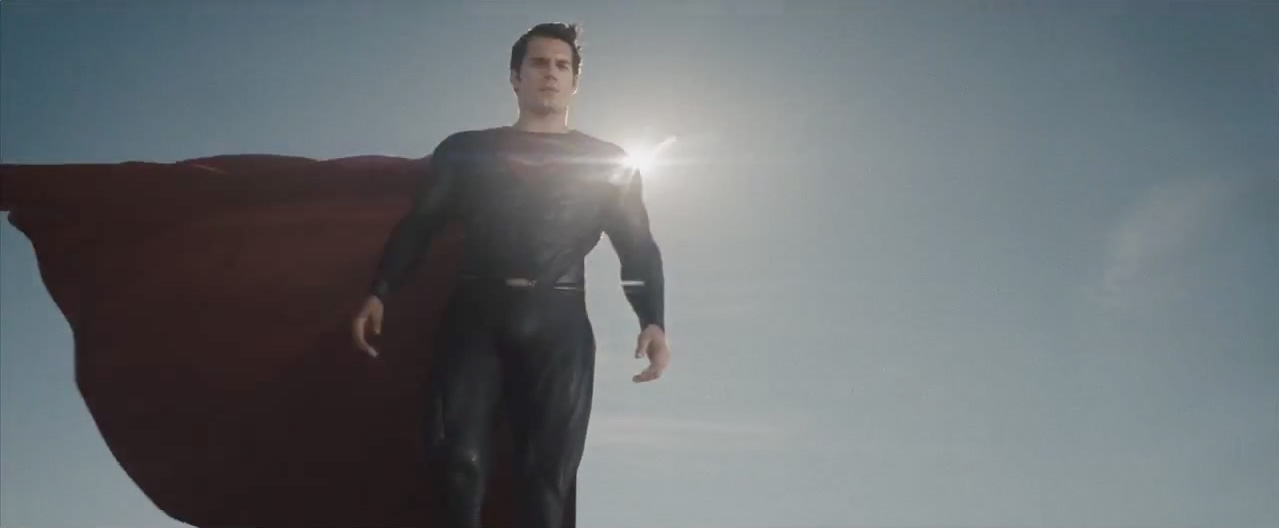
"I can do things other people can't..."
I know that many fans have an aversion to talking about "relatability" when it comes to cherished characters like Superman. "I don't know why we need to 'relate' to a flying man with superpowers" at least one fan has said to me personally. I think that kind of misses the point and that it comes down simply to whether we perceive the character in principally literal or figurative terms, and whether our relationship with Superman is more akin to worship or inspiration. Because relationship is the operative word there: make no mistake, you already relate to him in some way. In fact, your entire Superman fandom is just that, a relationship - with the character, with the creators who bring him to life, with other fans and, probably most importantly, with yourself.
So, ok, this piece's title is a little coy. Fact is, in my view a relatable Superman is all there's ever been.
Naturally, it isn't for me to tell you exactly what form your relationships should take, just as it isn't for me to say how you should or should not have reacted to the scene of a desperate Superman snapping the neck of a rampaging Zod. I can tell you my original reaction: I was stunned. It wasn't disapproval or mere shock, just... awareness. It was palpable, too, and while I had gone into the cinema that Thursday night having been accidentally tipped off and deduced it, still I wasn't really expecting it. But in that moment it made sense. Ambiguity, like Krypton, it seemed, "had its chance."
Snyder and Goyer said they set out to achieve a realism that had never before been seen in a Superman film. This was to be a world that wouldn't just unanimously accept the last son of Krypton with open arms, reflecting a world (a United States, somewhat more precisely) that, at least since Christopher Reeve's heyday in the role and definitely since the events in New York City on September 11, 2001, has seemed to many of us to grow more, not less, xenophobic and less, not more, self-absorbed. A world and a country that just may have lost some, you guessed it, hope. One in which we have become only more sensitive to the fragility of our lives and, in response, ever so slightly more suspicious and fearful of difference.
Our world, in other words, where we don't come back to life in a few months, stars of our own solo adventures. A world where the stakes are real.
Except, in the movie, it doesn't fully work out that way. One of the more common complaints about Man of Steel with which I am most sympathetic involves the relative lack of scenes showing Superman saving not simply Lois but also random regular people, the better to show his compassion. It's a fair point ("selective realism" according to T.A. Ewart), but I submit that this sense of inadequacy is mostly of a piece not with Superman's character but with the overall editing style of the film, which jumps around so much that it can sometimes be unnecessarily hard to follow, including the occasional skip jump from A straight to C, like Zod requesting that Lois join Superman on his ship - it's not overtly acknowledged and can seem convenient to the plot (how else is she going to "meet" Jor-El and learn how to access the Phantom Zone), but it has to do with Woodburn having outed Lois for knowing who Kal-El is: if Zod can broadcast on the world's televisions he can also surely watch them.
I saw Clark/Superman care a lot - the men on the offshore oil rig, that soldier to whom Superman is shown to explicitly ask if he's "Ok" (echoing the way his father does in that one flashback where Clark is bullied up against the fence), Colonel Hardy in Smallville the first time he faces Faora, Lois (yes, of course) those few times, and everybody else who wasn't at Metropolis ground zero while the world engine was operational (to which Zod's ship, Jax-Ur tells us, had become "slave," meaning that if Superman had stayed in Metropolis to take it out first as many have suggested, the world engine would still have needed to be dealt with) - but I agree it was imperfectly shown.
And it's because of this that I can appreciate the argument that "relatability" here as much as anywhere is just a fad, a quirk of the times, a ploy to separate us from our money. In some cases, it probably is. Certainly, I think the rumors of Superman's contemporary irrelevance are greatly exaggerated, but there's also an extent to which I live in a Superman-themed bubble. Of course he hasn't lost relevance to me. Like it or not, the overshadowing prominence of the likes of Batman (who was created as basically Superman's opulently dark shadow) does expose, outside the bubble, a relevance that has waned. That's what the marketers and the developers are looking at, which is why you hear that stuff in the talking points, which is why it seems disingenuous - neither relationships nor relatability are universal, and frustration with pitches and appeals made on such nakedly manipulative terms ("Now with more relatability!") is therefore absolutely to be expected. Me? I don't put much stock in anything I hear about something like a film from the people involved in creating it. Not before I see it. The fact is, Art is frequently accidental. Art happens.
It happened, I think even possibly by accident, to Man of Steel.
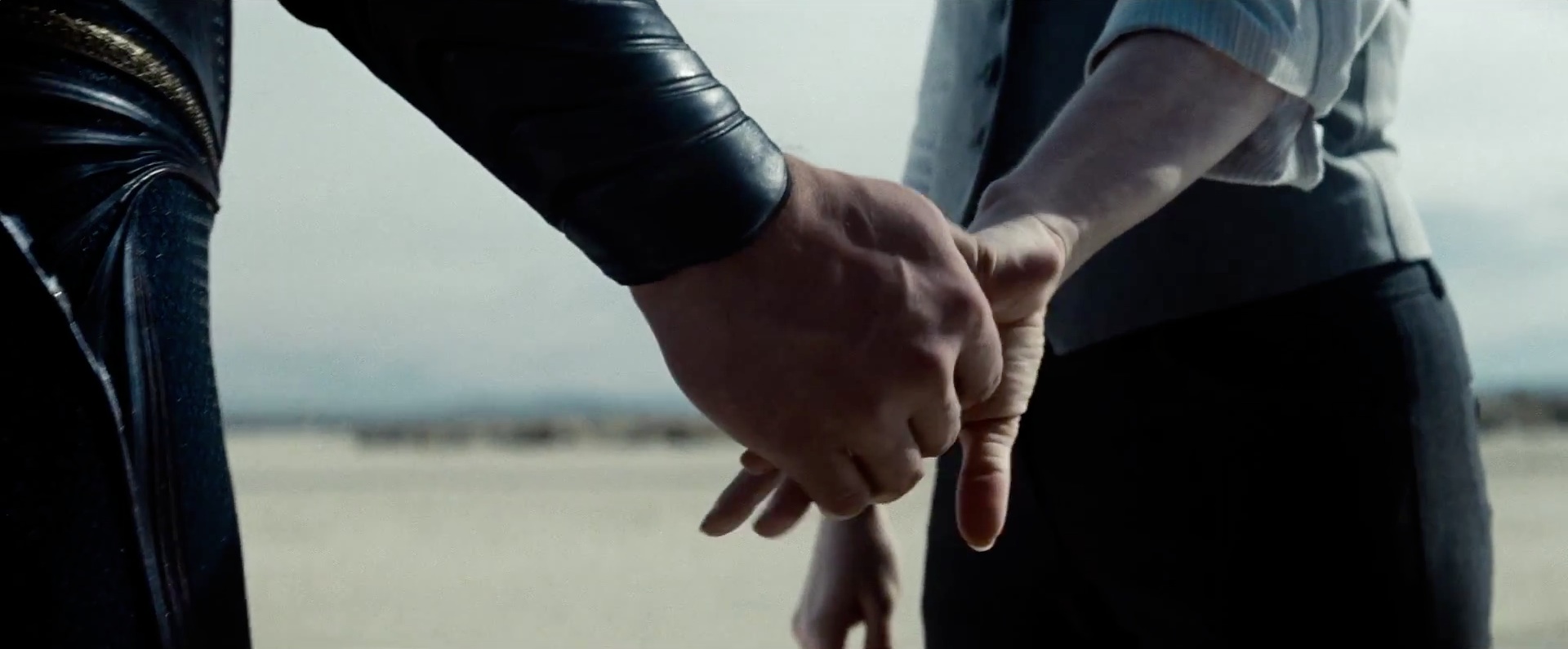
"Pretend it's an island, out in the ocean..."
Difficult though it may be, I am compelled to judge this film as a kind of closed system and on its own merits, not on the basis of its marketing nor (even harder) on other Superman stories. That's the kind of relationship I like to think I have with the character - where Superman is a "symbolic tool," to quote Grant Morrison, or "a text to be interpreted" rather than "a set of immutable values to be evangelized," as Jeff Jensen put it in Entertainment Weekly. That's not to say that I consider him to be completely malleable, but we are foolish not to recognize that neither he nor we have been in any way static since his introduction in 1938. And playing off exactly that recognition is also what I think the "relatability" marketing of superheroes fancies itself to be doing, however poorly in any particular instance.
No, I do not think Man of Steel is perfect. In my "first impressions" review, written during opening weekend, I gave it an 8 out of 10. Today, after repeated viewings and lots of time to think and think, I'd give it a 7. My main beef is that the editing (as already suggested) sometimes works against the timeline - especially into the dénouement where it seems life has returned impossibly to normal - while, at other times, it seems perfunctory. There are also the sour or clumsy notes of Lois calling out "Clark!" to a suited Superman in clear earshot of that police officer, of having the villain defend evolution, of "mad scientist" Jax-Ur speaking in a German accent, of Clark stealing those clothes (though his destroying that truck didn't bother me so much). But so is there the most precise visualization and effects we've ever seen; a score that, much though I love the classic John Williams', straight-up delivers on atmosphere and mood; a story that challenges our ethics and our expectations; and a lead who will, if given a chance to round him out with the inclusion of some mild-mannered reporter Clark Kent, probably go on to redefine the character for a generation.
But here's the thing: I saw hope. Its emergence, anyway, which is all I needed to see. I saw hope not accompanied by fanfare and wild applause, the kind you can take for granted because you see others doing the same, but private, earned at the worst kind of price and personified in a man who isn't exactly perfect and who can't always achieve the impossible but for whom the impossible is nevertheless the goal. It may seem jejune or unnecessary to you, but this story was very much about Clark finding himself, in the process finding Superman. It's completely fair game, in my opinion. Bildungsroman. Look it up if you have to. And if your objection is that nobody needs to see Superman "begin" because he's already so well known, I'd invite you to consider that origin stories are to superheroes what creation stories are to world cultures generally: foundational and ritualistic, indispensable.
In any case and all that said, I'm not concerned with ticks and boxes and ratings anymore. Not at this point. No, at this point I am mostly concerned with the tragedy of Zod.
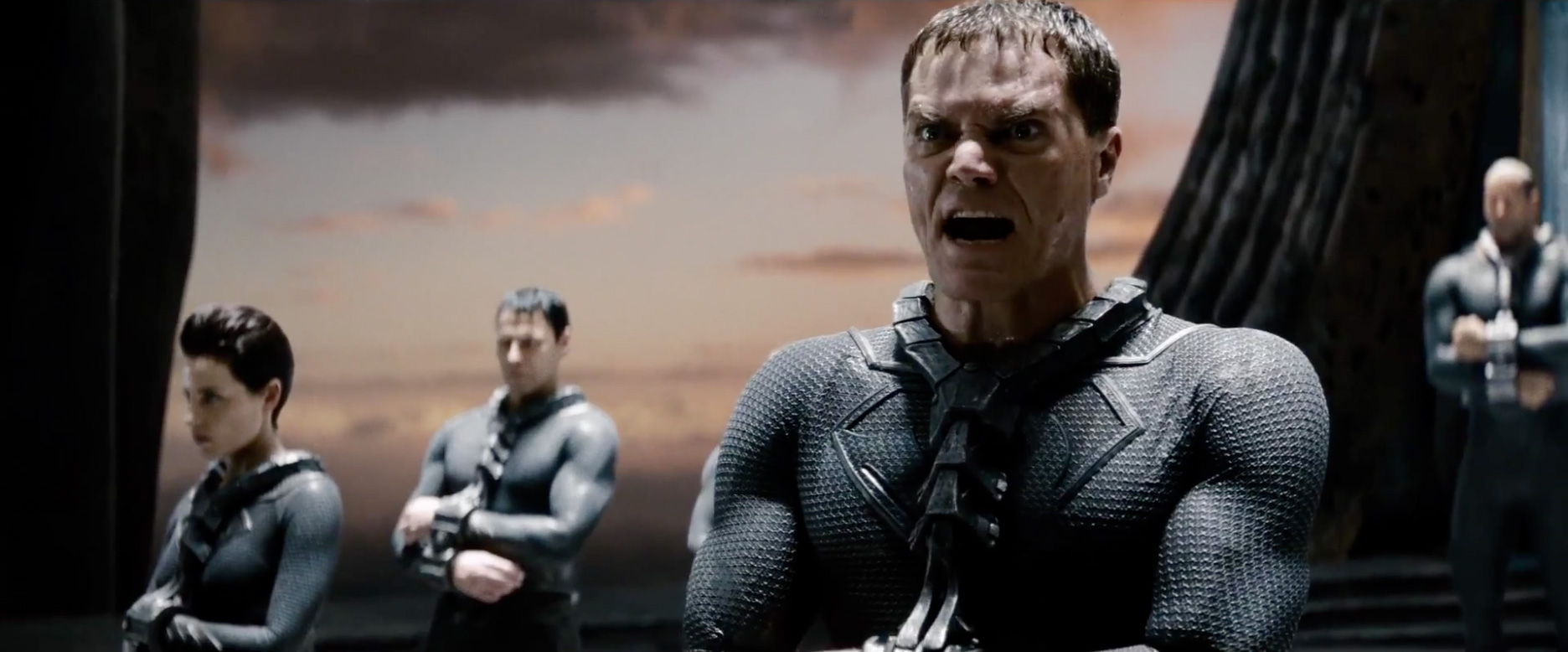
"I will find him..."
Since pretty much forever in comic books, superheroes have existed in worlds where death is essentially meaningless unless it is somehow formative to the development of the hero. I mean, just look at how basically no one ever ages. This is the great conceit and (self-)deception in which all superhero comic book readers participate - as consumers on one hand and commercial benefactors on the other. We enjoy comics, we collect and treasure them and so we tend not just to want but also to expect the stories to continue forever. And creators are only too happy to oblige, sometimes for the same reasons, "killing off" characters only to bring them back a short time later - and anyway, they introduced the serialization. (And they killed and returned Superman.)
But expectations are the same now with film franchises. So what are we supposed to think?
While the principal characters in these stories are fantastic and free of most limits, however (mortality being the biggest limit of all), we are not. We are simply incapable of keeping the story going seamlessly with no end, and we've demonstrated it over and over. Thus why all the reboots and summer cross-over "events," the one-shots and animated television shows. And why, of course, all the movies. This cornucopia of multi-media fosters both the infinitude of new works (and the revenues that come from them) as well as the rawest finitude that leads, in my view, to the real Art - the real humanness, in other words - demonstrated in the best of those works.
But it's nevertheless all a bit absurd, and the "no-kill code" serves as a necessary counterbalance to it, a mechanism by which the significance of death is confronted and given some meaning. It's also good ethics, provided your characters only ever have to face cartoon villains who have all the time in the world to get their schemes right.
And anyway, it's a tell rather than a show, as it were. And showing is how you get real suspension of disbelief.
Because look at what we saw from Zod's point of view: engineered to be a servant and a warrior and bred to pursue with an unyieldingly monomaniacal fervor the protection of the planet and people of Krypton, Zod also had the intelligence and sense of purpose necessary for leadership but not enough for genuine autonomy. Right to the bitter and highly controversial end, he remained a casualty of his programming and of Krypton's cultural stagnancy and failure to innovate. Nevertheless, even he is more enlightened than the current leaders of the planet. But as he has no productive idea what to do about it and, desperate to avert catastrophe, he defaults to the only approach he was ever going to have understood: violence, bloodshed and death cloaked in a veneer of due process. That poor council lady never knew what hit her. I mean, we're talking about a very deterministic Krypton here, though not so much that Zod is incapable of seeing the opposite horizon, even as he is powerless to change course. Notice the cold-eyed realization on his face in the moments after he kills Jor-El: he sees the error. When I say tragedy of Zod, I really mean it.
And it would have been a tragedy for everyone if Zod didn't have to face his.
So much so that in a "realistic" world that was facing an unprecedented and uncontainable threat, of which he himself is initially assumed to be a part, Clark finally crosses the darkest line (not with the childhood bullies, not with Ludlow), in the process killing more than Zod: he also kills a part of himself, severing the connection with his beginnings he had been longing to make his entire life and reaching instead for the real and honest one with humanity he had been afraid to make, and partly because that fear was taught.
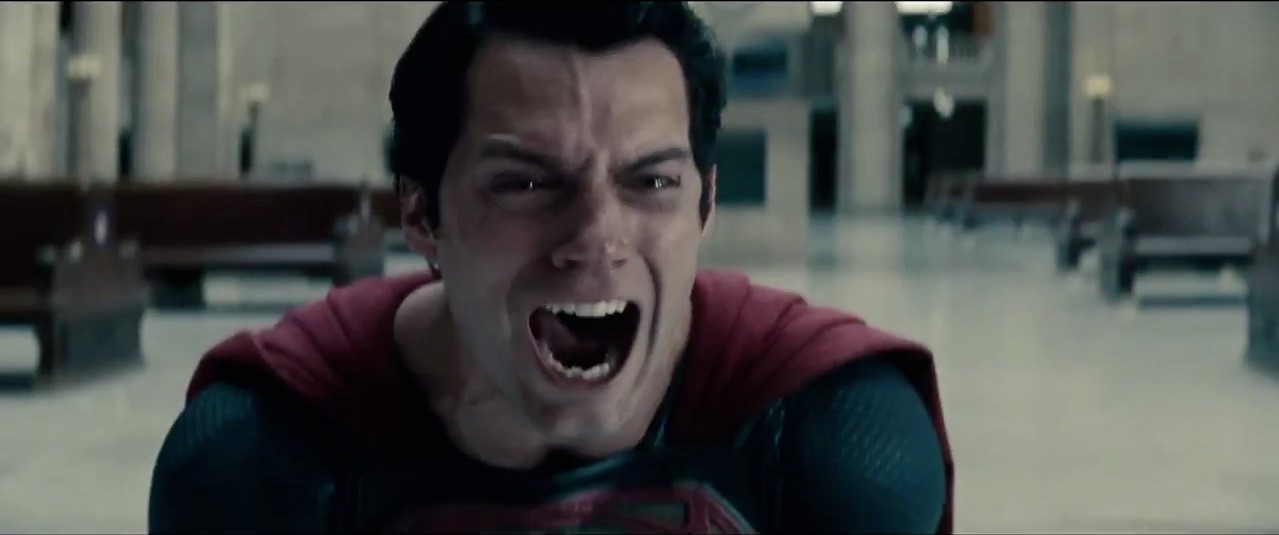
"The world's too big..."
As I've already suggested, I don't really care how Snyder and Goyer have tried to explain it (by my estimation, that's not where either of them excel), but showing this, clearly and unmistakably, wasn't atavistic or cynical. It was brave - not only because of the backlash they had to know would result but also because death is real, we expect our actual heroes to deliver it all the time, cheering when they do, and pretending otherwise gains us nothing.
It's never been Superman's soul on the line here, after all.
But the real limit he had to test was indeed the mortal one (also the moral one), the one at which the choice between a single destructive life and multiple productive lives was going to mean likewise choosing the alien race that was willing to sacrifice him over the one of his birth that wanted not to reclaim but to co-opt him.
And he chose the more vulnerable of the two because it was unambiguously the right choice; because despite their fear-borne reluctance to adopt him they were nevertheless the ones who needed protection; because he, the product of a rare love on Krypton, knew first hand humanity's capacity for love and (say it with me) hope, despite the fears and doubts passed down to him from Jonathan.
And because that's what a Superman does.
I suspect, meanwhile, that if Superman had also died, many fewer would have batted an eye over Zod's death. Or if we hadn't been shown it so unequivocally. (We would have been talking about Doomsday more, for one, which the circumstances in Man of Steel resemble more than they do the time Superman killed Zod and the others in the books.) That would have threaded the needle a bit more on the Christ angle, as well, but what then? Another elision of the consequence and the reality of killing and death because that's more convenient and more comforting? Outrage at the dwindling prospects for trilogy and franchise?
But actually, no, this film doesn't celebrate the destruction it shows us, it just doesn't hide it or from it: it confronts it directly, giving weight and scale to the level of power involved and acknowledging that, yes, many innocent civilians would perish from a battle between beings such as these.
Yay, I say unto thee that this film bravely confronts what we do not want to confront. We aren't supposed to cheer that scene; we are supposed to reckon with it and what it says about our expectations of our heroes - that death is unavoidable and sometimes tragic, as much for those who kill as for those who die. Grant Morrison lamented the evident bloodthirstiness of the superhero audience. Well, yeah. I lament that, too, and so, I think, does this film, as difficult as it might have been to see it through all the dust and debris.
There was no third option: this Zod, fully in control of his new abilities and also now severed from the only connection - the only source of restraint - he ever had, would have meant the end of humanity. I know and appreciate the counter-argument here: the third option was hope. But hope is what the death of Zod is supposed to be - for Earth if not for Krypton or even Superman himself, cold and twisted comfort though that may be to some.
Which is why the cheerful dénouement is indeed a problem, not altogether satisfyingly earned, but again I say that is more a problem of editing than of character or tone. It does seem all too pat, too resolved, too "Ok" after the worst kind of collective trauma imaginable. As much as a case might be made that this shows the resilience of the human spirit or something, a clearer indication of the actual scale of the damage and Superman's sense of it as well as how much time had passed would have helped.
And that's the main failure of Man of Steel's willingness to put Superman in that terrible position: though it meets head on the fact that our real heroes regularly kill to protect us, the collective relief from consequence that permeates the comics and contributes to them not being taken as seriously as they should be is nevertheless still at play.
Then again, I think the same would be true if Zod had been subdued but not killed or if he'd also been sucked into the Phantom Zone and the conflict had ended there. This story was a personal journey for Clark that had to conclude personally. While he did have help, and while it will be nice to see recognized the sacrifices of Emil Hamilton, Colonel Hardy and the others who died that day, Clark ultimately had to face his antagonists alone - which is to say not merely Zod but the instability, rage and despair he represents.
And seeing the hero face down his antagonists is entirely, you betcha, relatable.
Because isn't that the point of all of this? Strip away the sci-fi and the fantasy of aliens and superheroes and what are you left with but humans - you and me - on every side.
Like always.
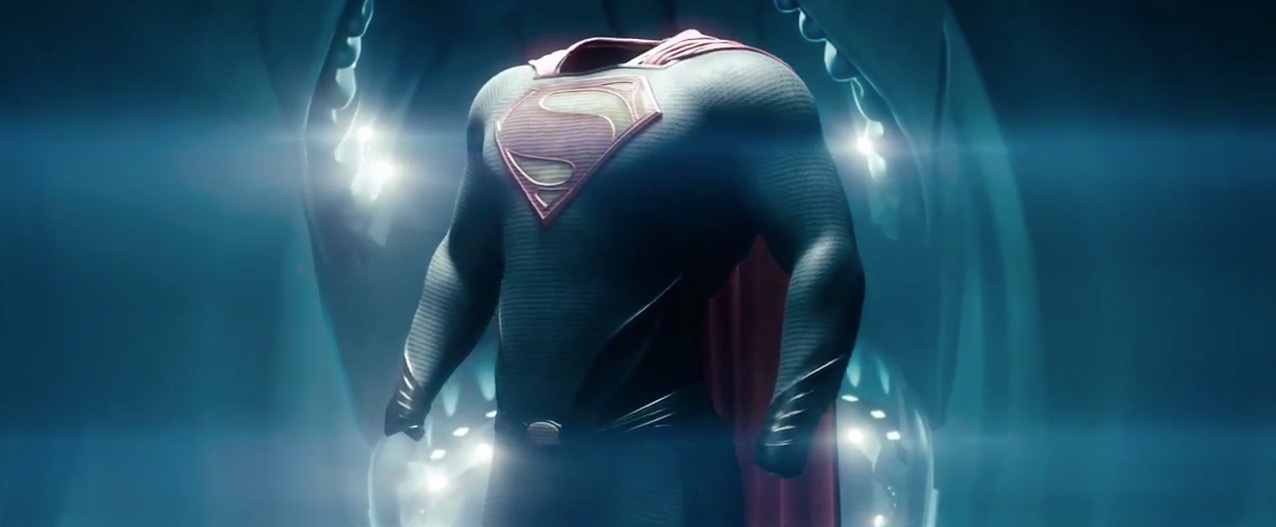
"It's not an S..."
Make no mistake, I understand why people expect Superman not to kill. But nor is it a mistake to expect Batman to meet the same standard, or Green Lantern, Flash, or Spider-Man - it's not a value specific only to our boy. And it's no mistake to relate to any of them either way.
What we're really talking about (what I'm talking about, anyway) is why we're so eager both to circumscribe what death can mean in a Superman story and to keep Superman away from it at almost all costs, unless it's him doing the dying. I don't think it's complicated: we're also reluctant to let it mean anything in our actual lives, despite the fact that it kind of means everything; that this desire we have never to see Superman kill or fail to make the save is rooted in our own fear of death and our corresponding desire to avoid it.
I can't say I blame anyone for that; it's completely human. But personally, I'm not looking to be saved; I'm looking for insight into how to do the saving. Call me crazy, but that's what I want from Superman. And, like I said, I saw hope emerge here - for Clark most of all. Hope in the form of self-acceptance and love, emergent in the recognition that you have to take care of yourself if you have any chance of taking care of others.
We always long for the unendingness of things that must end - comic book titles, a cool summer's breeze, certain individual actors in certain iconic roles, our lives. And while I certainly don't disregard the indignation of those who felt betrayal or offense in that moment, I also just don't feel those ways myself.
And this, at last, is why: Death is real. Sometimes, those who do us harm really mean to do us harm. Sometimes, some very rare times, taking a life is the right thing to do. And in Man of Steel, screened to a world where the people cheer at and celebrate news of the deaths of their enemies and where they are reported to have cheered at Zod's death, Superman, older now than most of us, shows us the correct response to a hard reality: anguish, grief and the sublime desperation of trying and failing to counter a forward momentum that cannot stop or be stopped - in other words time and the terrible tolls it takes.
But also the gifts it bestows.
Marc Pritchard
